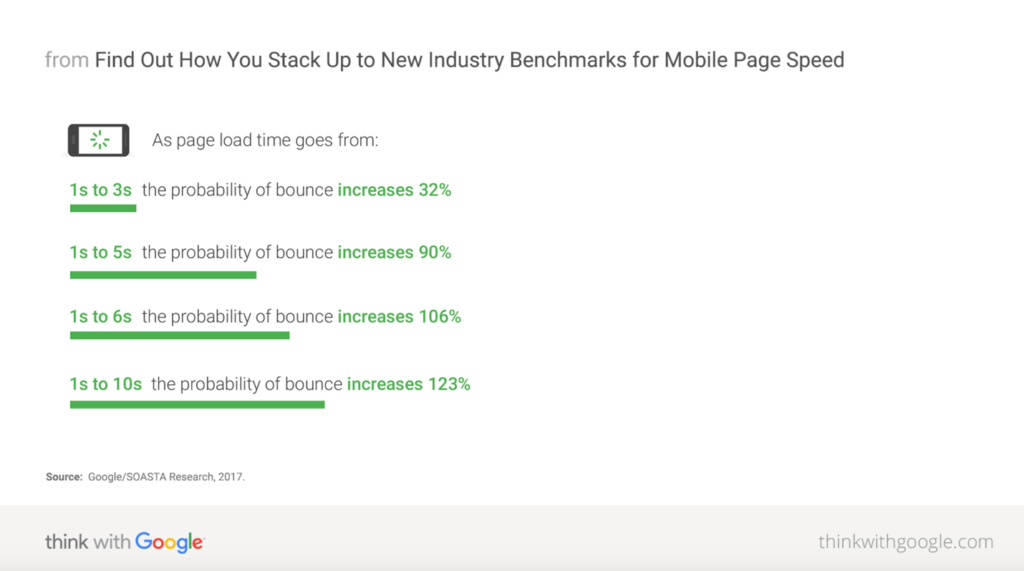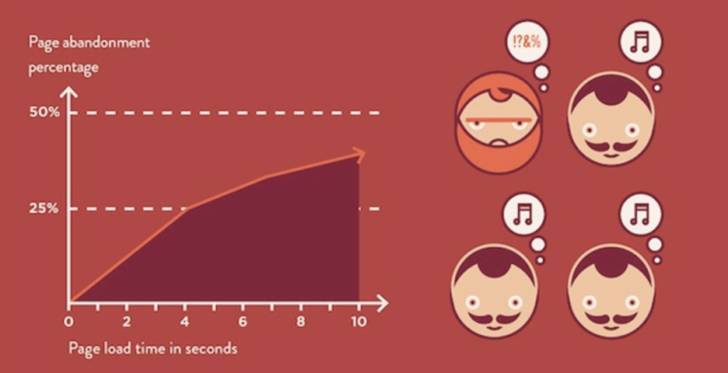30-second summary:
- The fact alone that the search engine giant has deemed site speed important should be enough for you to make it a priority.
- As your page load speed increases second-by-second, the bounce rate also increases a lot.
- It’s challenging enough to craft a call-to-action that convinces your site visitors to buy your product or services without adding any additional hurdles.
- Sprinkle in a bit of slow page load time, and you could be missing out on a ton of revenue.
- A walk through how to identify your site speed issues and fix them.
Google has confirmed site speed as one of the 200+ factors that Google uses to determine your website’s position in search. The fact alone that the search engine giant has deemed site speed important should be enough for you to make it a priority. Beyond that, however, there are other reasons you should place a focus on the speed of your site.
Let’s look at a couple of other critical reasons why you need to focus on your site’s speed for the success of your SEO efforts and the success of your business.
Keep visitors on your site
In a recent report, Google noted that 53% of mobile users will leave a site if it takes more than three seconds to load. That’s where we’re at in this world in regard to our attention spans. Think about all the traffic you could lose if over half of the visitors to your site leave simply because they don’t have the patience to stick around longer than three seconds for your site to load.
And with every second it takes for the pages on your site to load, the chances that your visitors will bounce increases. Take a look at this chart from the same study. It shows that, as your page load speed increases second-by-second, the bounce rate also increases, a lot.

Source: Think with Google
Reducing your site’s bounce rate is a focus for virtually every site owner or it should be anyway. So, make sure to pay attention to site speed to avoid issues in this area.
Stop losing business
It’s challenging enough to craft a call-to-action that convinces your site visitors to buy your product or services without adding any additional hurdles. Sprinkle in a bit of slow page load time, and you could be missing out on a ton of revenue.
In fact, in 2012, Fast Company had conducted a study showing that even a one-second increase in page load time could cost Amazon $1.6 billion in lost revenue. Granted, your business likely doesn’t bring in the same revenue as Amazon, but you can still work the formula backward from Amazon’s actual revenue, determine what percentage that loss accounts for and then apply that to your revenue.

Source: Fast Company
Whatever that number is, I can guarantee you it’s not a number you want to lose when it comes to revenue. No business wants to lose revenue, no matter how large or small.
What causes slow site speed and how do you fix the issues?
You get the importance by now of making sure your site loads quickly. So, now let’s look at a few reasons why your site might be bogged down.
1. Large media files
Videos, images, graphics, and other large media files can take up a lot of space. When a visitor hits your site, your site begins to serve up images, graphics, videos, and other media files that are supposed to exist on the page on which the visitor lands. If the files are super huge, this can slow down the speed of your site.
The fix
Host your video files elsewhere. Rather than hosting them on the site, host them in places like YouTube, Vimeo, and other such services. Then, embed the videos on your site. That way, visitors can still play the video right there on your page, but they won’t deal with any lag in load time. Regarding optimizing your images, try to use file types like JPEG, PNG, and GIF. These tend to load much more quickly than less optimized file types.
2. Avoid slow hosting services
While you may be tempted to cut costs in an area like website hosting, I strongly advise against doing so. There are some affordable hosting options that do offer decent site speed, but often the cheap, cost-saving hosting services come with slow page load speeds.
The fix
First, look to avoid shared servers if you want your site to load fast. Shared servers are ok for smaller sites, but if you want to avoid the lag time, opt for another type of hosting. There are a variety of options here depending upon your site and your particular needs. So, do your research and figure out what the best option for hosting is for your site.
3. Not picking the right CMS
There are tons of great CMS options for creating your website. Options such as Joomla, WordPress, Wix, and others are higher quality options and often help with your site’s load speed. There are less reliable CMS options, however, which can slow your site down.
The fix
WordPress is my personal preference for all the great plugins and other available tools at your disposal to help you boost your site’s performance. Avoid some of the lesser-known options, especially those with reputations for being highly unreliable. Focus instead on more proven options. If you’ve never heard of a particular CMS, do some digging, look at reviews, ask your peers, and make the best choice for your business.
4. Having too many redirects
Redirects are an easy way to point site visitors away from content like a 404 page and toward relevant content that actually exists and might meet their needs. The problem is, if you have too many redirects on your site, you can start to aggravate your site visitors. Think about the extra second or two a redirected link causes as it finds the new content. Those seconds could lose a visitor’s attention.
The fix
I’m not saying don’t use redirects. They are a highly useful tool. That said, try to use them sparingly. Also, try to limit multiple levels of redirects which can add even more seconds on to the page load time.
5. Too much code
Too much code can bog down your site. Javascript, CSS, and HTML can all include unnecessary code that can lead to your site slowing down.
The fix
Cut down on any unnecessary characters like commas and spaces. This alone can help speed up your site. Also, get a skilled developer to look at your code. There are potentially a lot of lines of code on your site that are unnecessary. One example of how this can happen is when someone copies and pastes something from a Word Document right into your site. This can add lots of lines of unnecessary code. In this instance, it’s best to instead copy and paste the text into a text editor, then bring the copy into your site.
These are just a handful of the many things that can slow down your site. Start here, as each of the above can have a significant impact. Then take it a step further and bring in an expert to dig through your site and analyze any other issues that might be impacting your site’s load time.
Wrapping things up
You’ve seen the evidence. Now I highly recommend digging around and checking out the page speed on your own website. Fortunately, that task is simple. Here are a few great tools to easily check the load speed of your website.
- Google’s Pagespeed insights
- YSlow
- Pingdom
- Uptrends
- Dotcom-Monitor
I can’t stress enough how important it is to focus on the speed of your website. Why put your site at risk of turning visitors away and missing out on revenue critical to the growth of your business. Even if you run a blog and don’t sell services or products directly on your site, your revenue likely comes through Google AdSense clicks or affiliate marketing, thus you still need to rely on high traffic levels and people sticking around your site.
So, no matter what niche you are in, get focused on site speed now, and address the issue before it becomes a major problem.
Anthony is the Founder of AnthonyGaenzle.com a marketing and business blog. He also serves as the Head of Marketing and Business Development at Granite Creative Group, a full-service marketing firm. He is a storyteller, strategist, and eternal student of marketing and business strategy.

